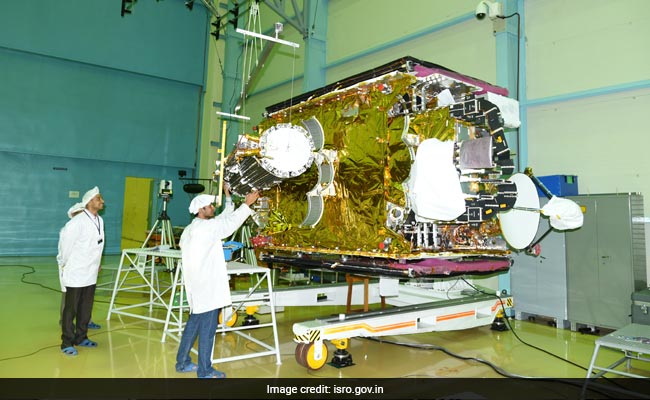
The GSAT-6A satellite will lift off aboard the GSLV rocket
Sriharikota:
Countdown has started at Sriharikota for space agency ISRO's big launch of a home-made communications satellite. The GSAT-6A - the twin of the GSAT- 6 launched in 2015 - will lift off at 4.56 pm on Thursday, riding the heavyweight GSLV rocket. Around 400 scientists and engineers have been called in to help with the launch at the Satish Dhawan Space Center, located on the coast near Chennai.
The cryogenic engine of the rocket, which is being tested for the sixth time, has new company: The high thrust Vikas engine, which works on liquid propellants, and will be used in the second stage to give the rocket a higher thrust.
In future, the Vikas engine may become the mainstay of Indian rockets and could even be deployed when India hoists the Chandrayaan-2 mission.
The GSAT-6A, which it will carry, is a very special communications satellite that weighs 2066 kg and cost around Rs 270 crore.
Former ISRO chairman Kiran Kumar said the GSAT-6A carries one of the largest antennas ISRO has built, with a diameter of 6 meters, which will open up like an umbrella once the satellite is in orbit. The huge size gives it more power, ensuring that its signals -- whether for data, video or voice -- can be received through smaller and smaller hand-held devices.
 The two satellites in tandem will provide signals that that would permit two-way exchange of data even from very remote locations where mobile connectivity is still limited -- which makes it very useful for the armed forces.
The two satellites in tandem will provide signals that that would permit two-way exchange of data even from very remote locations where mobile connectivity is still limited -- which makes it very useful for the armed forces.
The handheld devices are still being fine-tuned by the Defence Research and Development Organisation. The organization hopes to deploy a large number of these, especially for security personnel in Maoist-hit areas.
Part of the Antrix-Devas agreement, the GSAT-6A and GSAT- 6 ran into controversy after the government scrapped the deal with Bengaluru-based Devas Multimedia Private Ltd. An international arbitration is still on.
The cryogenic engine of the rocket, which is being tested for the sixth time, has new company: The high thrust Vikas engine, which works on liquid propellants, and will be used in the second stage to give the rocket a higher thrust.
In future, the Vikas engine may become the mainstay of Indian rockets and could even be deployed when India hoists the Chandrayaan-2 mission.
The GSAT-6A, which it will carry, is a very special communications satellite that weighs 2066 kg and cost around Rs 270 crore.
Former ISRO chairman Kiran Kumar said the GSAT-6A carries one of the largest antennas ISRO has built, with a diameter of 6 meters, which will open up like an umbrella once the satellite is in orbit. The huge size gives it more power, ensuring that its signals -- whether for data, video or voice -- can be received through smaller and smaller hand-held devices.

GSAT-6A satellite weighs 2066 kg and cost around Rs 270 crore
The handheld devices are still being fine-tuned by the Defence Research and Development Organisation. The organization hopes to deploy a large number of these, especially for security personnel in Maoist-hit areas.
Part of the Antrix-Devas agreement, the GSAT-6A and GSAT- 6 ran into controversy after the government scrapped the deal with Bengaluru-based Devas Multimedia Private Ltd. An international arbitration is still on.
Track Latest News Live on NDTV.com and get news updates from India and around the world

